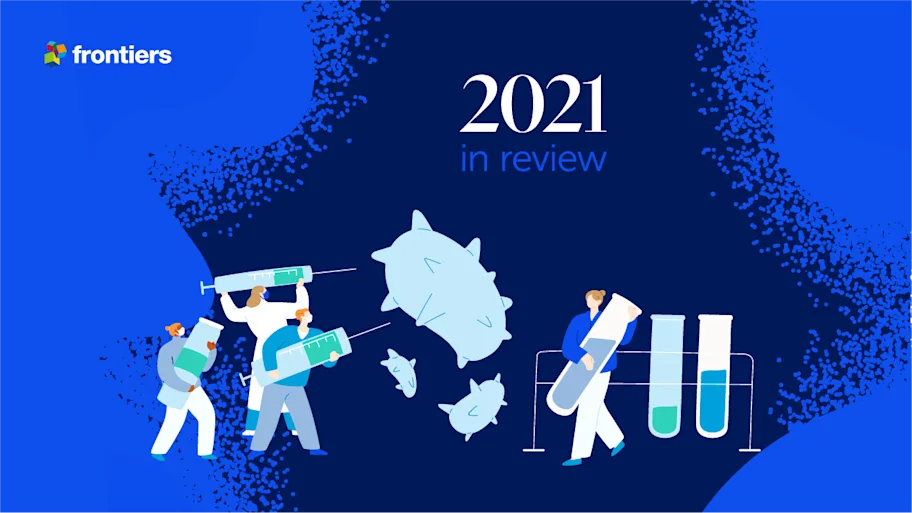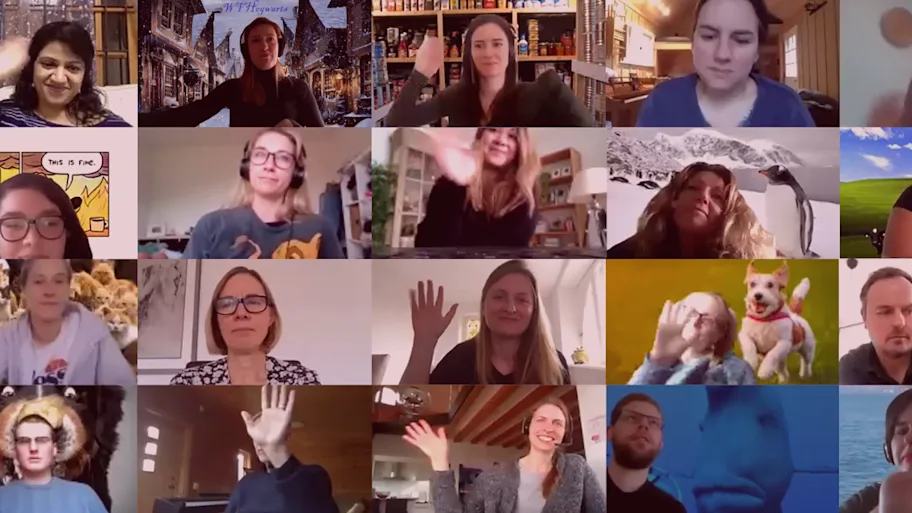
- Science news
- Top news
- 2020 in review: A turning point for scholarly publishing?
2020 in review: A turning point for scholarly publishing?
Mirjam Eckert, Chief Publishing Officer
2020 has been an extraordinary year of challenges. Standing on the top of a Swiss mountain on my birthday in mid-March, Frontiers CEO, Kamila Markram called me. We had had daily briefing sessions with the leadership team for the last couple of weeks as the COVID-19 situation unfolded in Europe. It was becoming obvious fast that waiting for clearer governmental guidelines for businesses was no longer an option. That afternoon, Kamila gathered the senior managers for a final meeting and within 24 hours, our teams were set up to work remotely. And here we are, nine months later, still working remotely.
As we became accustomed to Zoom meetings from our homes, pets, and children in the background, the immense task we faced began to dawn on us. First, a trickle and then a flood of COVID-19 research manuscripts started being submitted for consideration. In all my time working in scholarly publishing, never have I seen anything like it; an entire community rallying under a united cause.
Throughout the lockdown period, writing papers has been a major focus for researchers. We know this because, at the start of the summer, we interviewed 25,000 researchers from our academic community and asked them what they were working on. Three-quarters (74%) reported they were writing papers.
This change instigated a shift in our operational dynamic. More than ever, we felt the responsibility to review manuscripts at pace, with extreme rigor, while doing everything we could to support our editors and reviewers – some of whom were on the front line, others in hotspots areas – all I would think anxious about the future.
We and the wider research community also recognize, however, that in a similar vein to the concerns raised about the acceleration of vaccine development, speed is not a substitute for quality.
For me, the COVID-19 pandemic has highlighted some crucial changes in scholarly publishing:
Technology: The role and future of technology cannot be underestimated. Despite being an industry dating back hundreds of years, digitalization and the internet have created rapid change over the last two decades. And 2020 has highlighted just how much more important technology is going to be. The perceived paradox of quality and speed -- as well as quality and scale -- are familiar challenges, but they can be reconciled. Our AI tool, AIRA, is now being employed to both help find the right reviewers and assist in core elements of the peer review process itself. As this line in this article published in IEEE Spectrum suggests, “peer review may be set to undergo its biggest revolution ever—the integration of artificial intelligence.”
Open science: Throughout 2020, scientific research moved into the public spotlight starkly, with all eyes on the experts. Making science open is our core mission at Frontiers and the pandemic created an even greater sense of urgency in that respect. From memory, this was the largest opportunistic action to make research available to support a particular cause. What goes largely unsaid is that subscription publishers continue to earn nearly twice as much per article even when they made a few of them freely available to read. COVID-19 could be the tipping point here, where enough is enough, and society as whole demands all publicly funded research be made open – period.
Pre-prints: Researchers increasingly recognize the benefits of sharing their work quickly and extensively via the preprint route. This can be either before publication, so results are disseminated rapidly alongside the potential to claim ‘first discovery’, or post-publication, which means authors can share their work more widely in case it was published in a subscription journal. Preprints short-circuit the time to publication, and during the pandemic – the rate of publication of pre-prints accelerated considerably as researchers raced to find a vaccine. However, therein lies the danger. These manuscripts have not been subject to a rigorous peer-review process, which validates the paper before official publication. It could be then that this surge in pre-print publication does see a partial decline under less stressful circumstances.
What comes next?
What impact will a return to normality have on the academic publishing sector and what will ‘normality’ look like? Yes, we have seen a surge in submission this year due to COVID-19 and ostensibly, working conditions have been better suited to paper writing than lab work. It is a hard call. Another particularly interesting result from our academic survey revealed optimism in the research community is high. Nearly three-quarters of respondents reported that they believe their professional activities will go back to normal within a year once the pandemic is under control, and well over half in eight months or less.
Given that a vaccine is now being rolled out in the UK with other countries in hot pursuit, it could very well be that globally the pandemic could be considered ‘under control’ within the next six to 12 months – assuming the rollout of the vaccines at a global level is successful and the vaccine provides durable protection. I truly hope so. But I also wonder what this return to normal will look like? Will offices, labs, universities, and everything else all be as they were before the pandemic?
Our mission at Frontiers is to make science open – a task now more urgent than ever. There is no greater evidence of the need for this to happen than COVID-19; the cost of paywalls remains too high, both literally and figurately. New disasters – whether future pandemics or the climate emergency – can and will only be answered by sharing and pooling knowledge resources. COVID-19 has been a disaster, but if there is one positive that we can take from it, it is the lessons learned. Yet, for climate change, open access seems to lack the urgency required to see concerted action. While most COVID articles are available for everyone to read, for other global challenges of our time open access to essential research advances continues to hover in the 20-30% range. That needs to change.
The challenge for the publishing industry from here on out is to rise to that challenge, to make science open, and to fight for an informed future for the benefit of all people.






